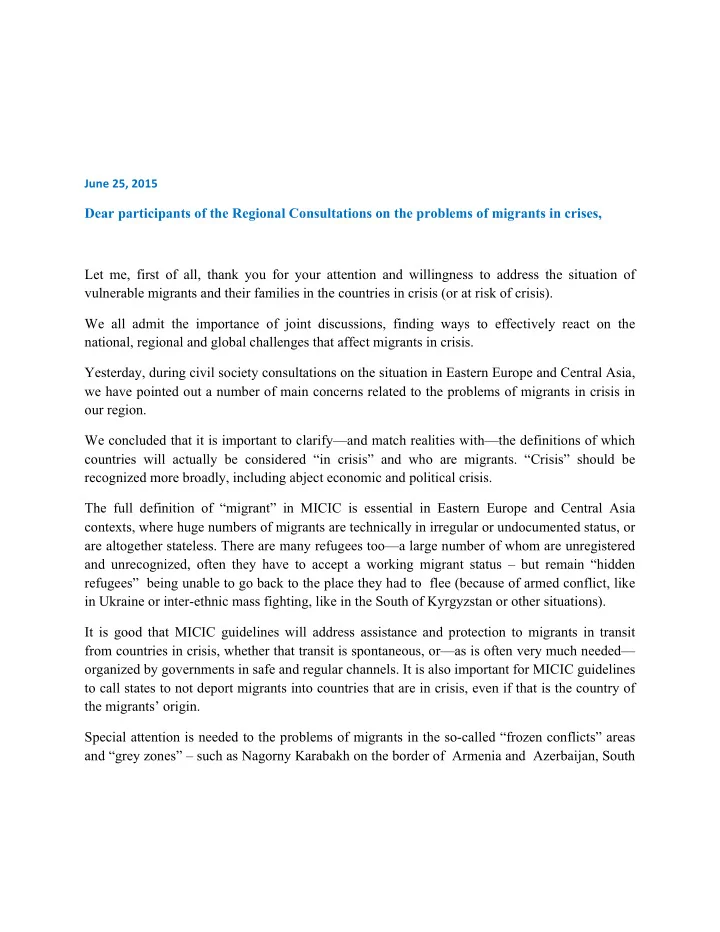

¡ ¡ ¡ June ¡25, ¡2015 ¡ Dear participants of the Regional Consultations on the problems of migrants in crises, Let me, first of all, thank you for your attention and willingness to address the situation of vulnerable migrants and their families in the countries in crisis (or at risk of crisis). We all admit the importance of joint discussions, finding ways to effectively react on the national, regional and global challenges that affect migrants in crisis. Yesterday, during civil society consultations on the situation in Eastern Europe and Central Asia, we have pointed out a number of main concerns related to the problems of migrants in crisis in our region. We concluded that it is important to clarify—and match realities with—the definitions of which countries will actually be considered “in crisis” and who are migrants. “Crisis” should be recognized more broadly, including abject economic and political crisis. The full definition of “migrant” in MICIC is essential in Eastern Europe and Central Asia contexts, where huge numbers of migrants are technically in irregular or undocumented status, or are altogether stateless. There are many refugees too—a large number of whom are unregistered and unrecognized, often they have to accept a working migrant status – but remain “hidden refugees” being unable to go back to the place they had to flee (because of armed conflict, like in Ukraine or inter-ethnic mass fighting, like in the South of Kyrgyzstan or other situations). It is good that MICIC guidelines will address assistance and protection to migrants in transit from countries in crisis, whether that transit is spontaneous, or—as is often very much needed— organized by governments in safe and regular channels. It is also important for MICIC guidelines to call states to not deport migrants into countries that are in crisis, even if that is the country of the migrants’ origin. Special attention is needed to the problems of migrants in the so-called “frozen conflicts” areas and “grey zones” – such as Nagorny Karabakh on the border of Armenia and Azerbaijan, South
Osetia and Abkhazia, Transnistria and Crimea (here is the map of these zones) Our experience in every country in the region is that the more the human rights of migrants are protected in ordinary times, the better they are able to help themselves and participate effectively with government efforts in times of crisis. At present however, even outside of crises, large numbers of migrants in the region are trapped: by the effects of bilateral agreements that, far away from international standards, limit migrants rights to mobility, or create regimes for visas, readmission and externalized enforcement that block the ability of migrants to move out of countries in crisis; by immigration and justice systems that keep migrants in irregular status, undocumented or stateless, even on minor administrative technicalities; by widespread government acts or tolerance of discrimination and xenophobia against migrants, including by police in many countries in the region, and criminalization of migrants, including arbitrary detention and imprisonment. Examples include human trafficking, recruitment processes and employers that exploit migrants and abusive working conditions, keep passports or isolate migrants in jobs like domestic and agricultural work; by laws that block migrants from organizing their own associations and communications networks, or joining and forming trade unions.
It is important to avoid persecution of migrants in crisis situation - in no way they should be put in detention-centers, while deportation is impossible (like with the stateless persons or those who cannot be sent out of the country for other well-known reasons – like war etc.) neither sentenced to pay penalty. Countries of origin need to strengthen their consular supports to their nationals abroad, engaging alternate supports where necessary, e.g., Red Cross-Red Crescent societies, or as in one the creation of “Working Groups” involving experts assisting consulate officials. Governments and civil society actors, including academics, need to work much harder on gathering and analyzing statistics that match international standards on foreign-born residents, their access to rights and preparedness for crisis response. Finally, greater care and review is important in assistance and protection of migrants in countries in crisis and fulfilling all the national and international obligations towards Human Rights guarantees for all migrants always and everywhere.
Recommend
More recommend